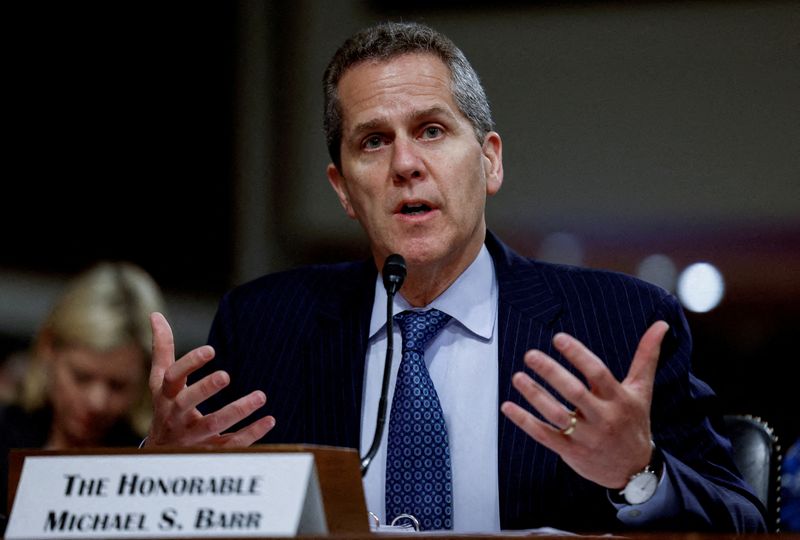By Pete Schroeder
WASHINGTON (Reuters) -A plan by the top U.S. banking cop to make the sector more resilient may have gotten a boost from the recent banking crisis, but still faces numerous challenges.
Fed Vice Chair for Supervision Michael Barr has laid out a plan to increase capital requirements for the nation's largest banks in the wake of recent bank failures and is expected to unveil the broad proposal to implement new risk-based capital requirements on July 27, according to three industry officials.
The proposal, which will kick off an ambitious agenda for Barr, plans to fully implement the globally agreed Basel bank capital agreement. He has said subsequent efforts will include expanding annual "stress tests" of banks' health, and pursuing tougher rules around liquidity, compensation and interest rate risk.
Banking lobbyists, who declined to be named, and analysts, admit Barr should have enough support to advance his priorities at the relevant agencies. A trio of regulators -- the Fed, Federal Deposit Insurance Corporation and Office of the Comptroller of the Currency -- would have to sign off on proposed and finalized versions of new bank rules, including votes by the boards of the Fed and FDIC.
"The mini-liquidity crisis just poured gasoline on Michael Barr's fire and gave him an enormous amount of political capital," said Isaac Boltansky, director of policy research for brokerage BTIG.
Still, the industry and its allies plan to make it difficult, as Barr must grapple with their complaints, dissent from fellow regulators, skeptical Republican lawmakers, and a crowded schedule, according to analysts and six banking lobbyists.
"Vice Chairman Barr is going to face economic, political, procedural and even personal hurdles in getting these regulatory changes done. But there is no reason to believe that he will be stopped," added Boltansky.
Spokespeople for the Fed and the FDIC declined requests for official comment.
BANKING OPPOSITION
The banking industry is not waiting for details before trying to disrupt the effort, arguing it could hinder economic activity, curb lending, and kill lines of business.
Members of the industry are leaning on lawmakers as a way of pressuring Barr, according to three industry lobbyists, without specifying which lawmakers.
At the center of the industry's complaints is a belief the capital hikes are not justified, and that Barr's process of reviewing existing rules has been opaque.
"We don’t think there’s any substantiation of the need to raise capital," said Kevin Fromer, president and CEO of the Financial Services Forum, which represents large global banks.
That message is already resonating with some members of Congress, particularly Republicans. When Fed Chair Jerome Powell testified in June, he was pressed repeatedly on the pending rules. Powell, who in the past has said he would defer to Barr on regulatory matters, acknowledged there are tradeoffs that come with higher capital, but said stronger capital meant a stronger system and regulators need to find the right balance.
Earlier this month, two members of the House Financial Services Committee, Republican Andy Barr and Democrat Bill Foster, sent a letter to Barr seeking more details and for testimony to explain the effort. Spokespeople for the lawmakers declined or did not respond to requests for comment.
“This is a broad and sweeping proposal. The changes laid out today should be based on a formal quantitative impact analysis rather than anecdotes," said a spokeswoman for Senator Tim Scott, the top Republican on the Senate Banking Committee.
The criticism is also emerging among some Republican bank regulators, who appear likely to oppose the plans. Fed Governor Michelle Bowman has warned in several speeches against Barr's approach, and Republican members of the FDIC board have also warned against sweeping changes.
A group of five of the industry's largest trade groups said they had "serious concerns" with Barr's plans in a letter sent last Thursday to Powell. They argued they need at least four months to digest and comment on the proposal, which is expected to be technical and lengthy.
CROWDED CALENDAR
Beyond external pressure, Barr must also contend with a crowded calendar. Barr is already one year into his four-year term, and is also looking to propose changes to accounting and long-term debt requirements for smaller firms, annual bank stress tests, liquidity and compensation rules, and Fed bank supervision.
The initial rewrite is expected to take substantial time. Regulators will have to digest numerous and voluminous comments from the banking industry dissecting their plans.
And there is only so much time. Elections in the fall of 2024 could see Republicans take full control of Congress and the White House, which would up pushback. A Republican-held Congress could even vote to throw out recently completed rules under the Congressional Review Act.
The Fed would likely need to complete rules in the summer of 2024 to ensure they could not be repealed by that route, according to one bank lobbyist.

And in the meantime, banks are expected to continue hammering that higher capital requirements means a smaller economic role for banks and are not needed.
"It's kind of hard for me to sit here and say that we won't be commenting forcefully that we are very well capitalized," said Morgan Stanley (NYSE:MS) CEO James Gorman on a quarterly earnings call Tuesday. "I would hope and expect that they're going to listen," he added later.